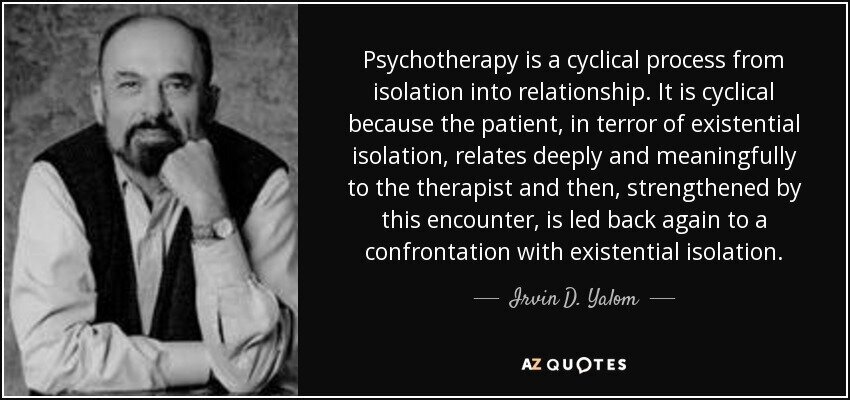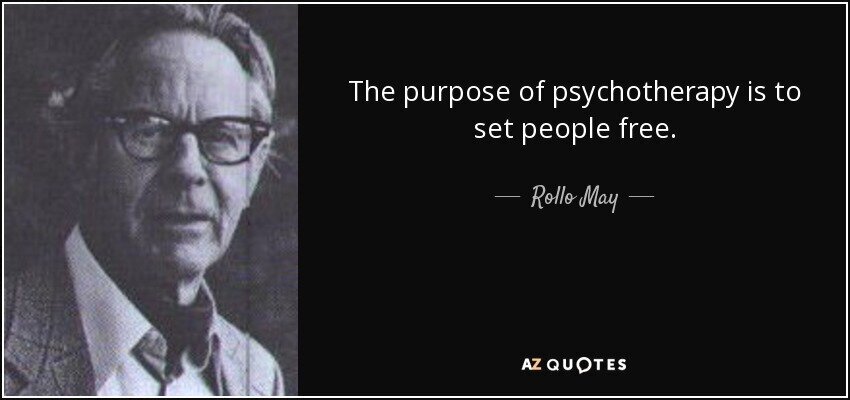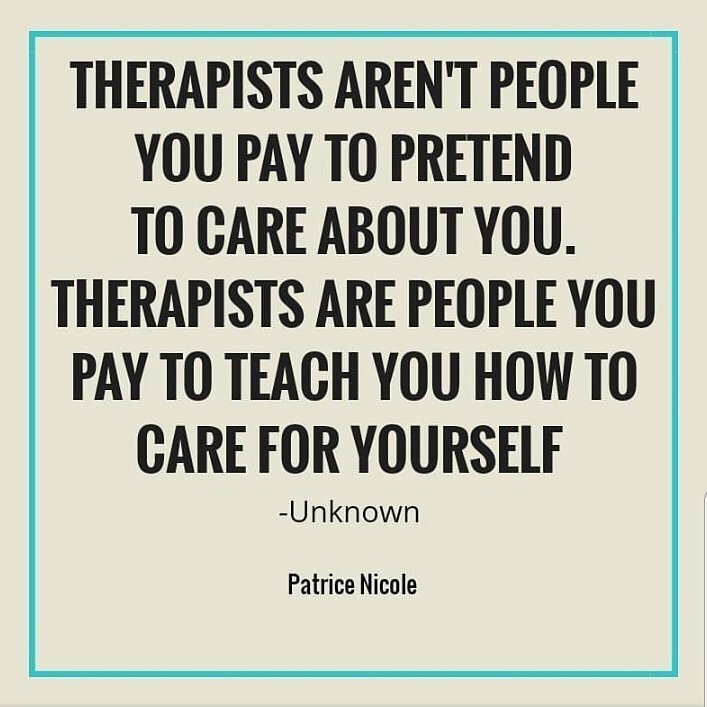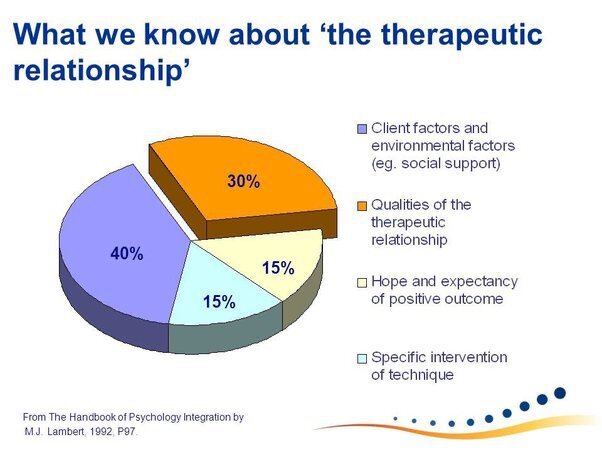- Articles
- Forum Archive
- Psychology, Psychiatry, Psychotherapy, and Health
- Therapy, Therapists, and Self-Help
You are using an out of date browser. It may not display this or other websites correctly.
You should upgrade or use an alternative browser.
You should upgrade or use an alternative browser.
More threads by Daniel E.

 qr.ae
qr.ae
"Some therapists have been doing the work for too long and lose interest in their clients. They listen, say something smart, but may lack the energy and enthusiasm that the profession requires. Lack of attunement can trigger abandonment issues in clients. If the therapist doesn’t know how to take a break and recover from the burnout, she/he could be considered a bad therapist if s[h]e continues working in such a depleted state of mind."
 publichealth.jhu.edu
(2014)
publichealth.jhu.edu
(2014)
After 10 years, the suicide rate for those who had therapy was 229 per 100,000 compared to 314 per 100,000 in the group that did not get the treatment.

 www.psychologytoday.com
www.psychologytoday.com
While mainstream therapy (of both the talk and drug variety) reinforces a causal view of the world, to those of us who practice non-causal approaches it is clear that much of people’s emotional pain comes from thinking causally—and we’re finding more and more evidence that challenging this way of thinking can be extremely helpful to people.

 www.frontiersin.org
www.frontiersin.org
"As humans, we are on a life-long quest to feel safe."
~ Stephen W. Porges
"Expecting a long-lasting sense of safety is often too much. A micro-moment of feeling that regulation and that ability to think, “The world is OK, I’m going to be OK in it,” Those micro-moments then begin to string together, and those micro-moments can become anchors for us."
~ Deb Dana
"What do I want?" and "How do I feel?": Most therapy sessions boil down to these two essential questions. They can serve as a "home base" for you during sessions. If you reach a moment where you feel stuck and don't know what to say, you can always come back to these questions. You can even say them aloud - it will help the therapist know what you're thinking about.
~ Ryan Howes, Ph.D.

 forum.psychlinks.ca
forum.psychlinks.ca
"Solution Focus has no theory of person, no picture of the person, fully functioning or otherwise. All that interests us is talking with the client in such a way that the client reports to us that they have made sufficient progress."
~ Evan George
Patient dropout is associated with numerous problems, such as: loss of potential patient improvement, poorer outcomes, increased likelihood of over-utilizing resources, and disruption in group therapy settings. Intuitively, these patients lose out on the benefits they may have received if they continued treatment. They also face poorer outcomes and fewer benefits of therapy compared to those who continue with treatment.
Further, patients who discontinue treatment are more likely to be characterized as chronic patients, resulting in over-utilization of services, up to twice as much as "appropriate" terminators. In a group therapy session, premature discontinuation of one member may in turn adversely affect the other members of the group.

What are some warning signs of a bad therapist?
Antonieta Contreras's answer: There are great answers already, but for the fun of thinking what my colleagues can be doing wrong, or which ones of them could be considered “bad therapists” I’ll add some other “signs.” Judgemental: some therapists are biased against certain behavior, ideologies, ...
"Some therapists have been doing the work for too long and lose interest in their clients. They listen, say something smart, but may lack the energy and enthusiasm that the profession requires. Lack of attunement can trigger abandonment issues in clients. If the therapist doesn’t know how to take a break and recover from the burnout, she/he could be considered a bad therapist if s[h]e continues working in such a depleted state of mind."
"Although many factors contribute to premature client termination, the number one cited reason by clients is dissatisfaction with the therapist."
"One of the most distinguishing characteristics of therapists who have low dropout rates is that they actively seek feedback—both positive and negative—regarding the effectiveness of their clinical work."
~ Bernard Schwartz, PhD
"One of the most distinguishing characteristics of therapists who have low dropout rates is that they actively seek feedback—both positive and negative—regarding the effectiveness of their clinical work."
~ Bernard Schwartz, PhD
Suicide Risk Falls Substantially After Talk Therapy | Johns Hopkins Bloomberg School of Public Health
Repeat suicide attempts and deaths by suicide were roughly 25 percent lower among a group of Danish people who underwent voluntary short-term psychosocial counseling after a suicide attempt, new research suggests..
After 10 years, the suicide rate for those who had therapy was 229 per 100,000 compared to 314 per 100,000 in the group that did not get the treatment.
"All you can do for another person is be an environment in which if they wanted to come up for air, they could."
~ Ram Dass
~ Ram Dass
"Sometimes we hide ourselves to survive. To make pain go away we simply make ourselves go away, and that is how madness is created. Freud teaches that trauma is overwhelming, like a baby after screaming out of hunger, that unknowingly sinks, falls asleep, ‘loses consciousness.’ We also do the same, as adults. But we always return and always survive."
~ Michael Eigen, Therapist from the Depths: A Conversation with Michael Eigen
~ Michael Eigen, Therapist from the Depths: A Conversation with Michael Eigen
"We all relapse. I relapsed yesterday."
"To me, the difference between therapist and patient is a slim and somewhat artificial distinction."
~ David Burns
"To me, the difference between therapist and patient is a slim and somewhat artificial distinction."
~ David Burns

Why Ask Why?
We might be surprised at how we feel when we loosen the hold causality has on us.
While mainstream therapy (of both the talk and drug variety) reinforces a causal view of the world, to those of us who practice non-causal approaches it is clear that much of people’s emotional pain comes from thinking causally—and we’re finding more and more evidence that challenging this way of thinking can be extremely helpful to people.

Frontiers | Polyvagal Theory: A Science of Safety
Contemporary strategies for health and wellbeing fail our biological needs by not acknowledging that feelings of safety emerge from internal physiological st...
"As humans, we are on a life-long quest to feel safe."
~ Stephen W. Porges
Befriending Your Nervous System
https://resources.soundstrue.com/podcast/deb-dana-befriending-your-nervous-system/ Expecting a long-lasting sense of safety is often too much. A micro-moment of feeling that regulation and that ability to think, “The world is OK, I’m going to be OK in it,” Those micro-moments then begin to...
forum.psychlinks.ca
"Expecting a long-lasting sense of safety is often too much. A micro-moment of feeling that regulation and that ability to think, “The world is OK, I’m going to be OK in it,” Those micro-moments then begin to string together, and those micro-moments can become anchors for us."
~ Deb Dana
Therapy Constipation
Therapy Constipation | Psychology Today Blogs By Ryan Howes, Ph.D. May 31, 2008 Jane Doe looks concerned. "Okay, I'm here. We've talked about my history, my family and the symptoms I'm experiencing. But I'm stuck. I don't know what to talk about next. What should I say?" If...
forum.psychlinks.ca
"What do I want?" and "How do I feel?": Most therapy sessions boil down to these two essential questions. They can serve as a "home base" for you during sessions. If you reach a moment where you feel stuck and don't know what to say, you can always come back to these questions. You can even say them aloud - it will help the therapist know what you're thinking about.
~ Ryan Howes, Ph.D.

Solution-Focused Quotes & Memes
"Questions and compliments are the primary tools of the solution-focused approach. SF therapists and counselors deliberately refrain from making interpretations and rarely confront their clients. Instead, they focus on identifying the client's goals, generating a detailed description of what...
"Solution Focus has no theory of person, no picture of the person, fully functioning or otherwise. All that interests us is talking with the client in such a way that the client reports to us that they have made sufficient progress."
~ Evan George
“Sometimes the smallest step in the right direction ends up being the biggest step of your life. Tiptoe if you must, but take a step.”
— Naeem Callaway
— Naeem Callaway
“Life itself still remains a very effective therapist.”
“Patients coming for consultation complain about headaches, sexual disturbances, inhibitions in work, or other symptoms; as a rule, they do not complain about having lost touch with the core of their psychic existence.”
“For the analyst it is a source of never-ending astonishment how comparatively well a person can function with the core of himself not participating.”
― Karen Horney (1885-1952)
“Patients coming for consultation complain about headaches, sexual disturbances, inhibitions in work, or other symptoms; as a rule, they do not complain about having lost touch with the core of their psychic existence.”
“For the analyst it is a source of never-ending astonishment how comparatively well a person can function with the core of himself not participating.”
― Karen Horney (1885-1952)
"We have to create ourselves as a work of art."
~ Michel Foucault
~ Michel Foucault
Patient dropout is associated with numerous problems, such as: loss of potential patient improvement, poorer outcomes, increased likelihood of over-utilizing resources, and disruption in group therapy settings. Intuitively, these patients lose out on the benefits they may have received if they continued treatment. They also face poorer outcomes and fewer benefits of therapy compared to those who continue with treatment.
Further, patients who discontinue treatment are more likely to be characterized as chronic patients, resulting in over-utilization of services, up to twice as much as "appropriate" terminators. In a group therapy session, premature discontinuation of one member may in turn adversely affect the other members of the group.
Replying is not possible. This forum is only available as an archive.
Similar threads
- Replies
- 64
- Views
- 26K
- Replies
- 5
- Views
- 4K
- Replies
- 15
- Views
- 5K





